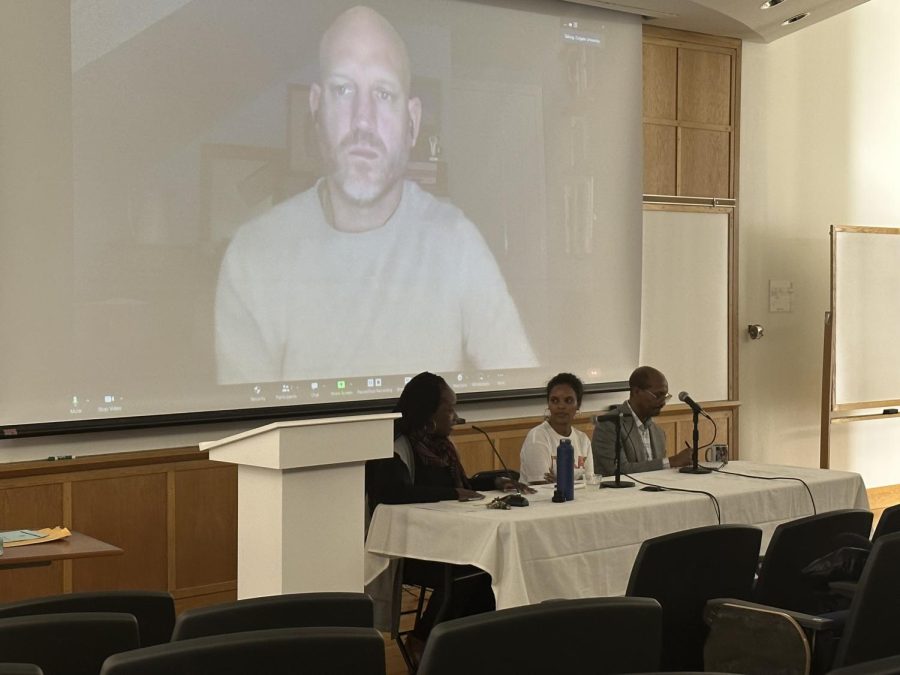PCON Panel Discusses ‘Inaction’ in Tigray War
Colgate University’s Peace and Conflict Studies department hosted a panel in Persson Hall on Thursday, March 2 discussing the ongoing conflict in Tigray, with panelists Meaza Gidey, a Tigrayan human rights activist, William Davison, a crisis group analyst, and Tigrayan Professor of Biology at Colgate, Engda Hagos.
In November 2020, an armed conflict broke out between the Federal Government of Ethiopia and the local government and leaders of Tigray, a region of Ethiopia that had been pushing for self-governance. The next two years of conflict were marked by human rights abuses, war crimes, crimes against humanity, and other atrocities. Over 100,000 people have been killed, and at least 2.5 million have been displaced.
The conflict began due to a dispute regarding elections in Tigray, which was part of an even older point of contention within Ethiopia. Gidey stated that Ethiopia is made up of much older and smaller regions that historically have been separated.
“Ethiopia is not one country, there is not a national identity,” Gidey said.
Despite the large human cost of the conflict, few outside of the region have heard about what is happening in Tigray. Davison noted that lack of news coverage is a general problem in Ethiopia.
“News in Ethiopia, events and suffering, receives less media attention from countries nearby or even within Ethiopia,” Davison said.
The Ethiopian federal government actively isolates Tigray from the media, and from the world in general, which only furthers the issue.
“The Federal Government and its allies deliberately closed off Tigray. People couldn’t get in to find information, and people couldn’t get out either,” Davison said.
Other nations and international organizations were aware of the conflict and the crimes being committed, but a lack of pressure and uncertainty regarding the information coming out of Tigray allowed for the people who could have intervened to sit by while genocidal actions took place.
“They (the international community) were able to justify inaction based on their ignorance,” Davison said.
According to Gidey, the members of the international community predicted the crisis before it even started, but those in power did little to prevent it.
“The world knew what was happening before it began. The signs were there and intellectuals and crisis groups were calling on the international community to help,” Gidey said.
Soon into the conflict, the Tigrayan government had to flee the capital, making it even more difficult to coordinate any form of intervention. Even when activists were able to get information about the atrocities out of Tigray, they rarely were able to get policymakers to work with them.
“We had to beg policymakers to listen to us. Nobody would talk to us. No one was directly engaging us,” Gidey said.
In November of 2022, a peace agreement was reached between both sides, but this has done little to close the wounds the conflict has caused for Tigrayans.
“This entire conflict has made us question where we belong. Our own people have attacked us,” Gidey said.
Hagos noted that he doesn’t view the peace agreement as having done much to truly end the conflict.
“I don’t trust this as a peace agreement. People are still dying. People can’t communicate with their families,” Hagos said. “On paper, it looks good, the international community is happy. But structurally there is nothing there.”
Though the peace agreement has ended large-scale battles between Tigray and the Ethiopian Government, one of the major causes of deaths throughout the war, outside analysts agree that there is still a lot of work to be done.
“Really all that has occurred is that the governments are making an attempt to reconcile… All of the issues that started the war remain and many issues caused by the war also have not been resolved,” Davison said.
Even with the end of the war, the people of Tigray are not at peace. Many have lost friends and family, and there is still a lack of humanitarian support, according to Gidey. It will take a long time for the people of Tigray to find stability or closure.
“The guns have been silenced, but our people still suffer,” Gidey said.











